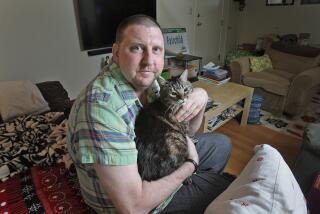When a doctor must say the worst
For some doctors, it’s more wrenching than death itself: telling a patient that he or she is dying.
Not only is there no right way to break the news -- what eases the transition for one patient doesn’t for another -- but often these conversations can make matters worse.
Some doctors are too blunt, coming across as uncaring when a patient most needs their support. Others fail to provide the information necessary for the ill person to make informed decisions. Still other physicians fail to make the finality of the situation clear: They never actually say that death is imminent.
“There’s very much a cultural divide between doctors and patients, especially surrounding the topic of dying,” said Dr. William Lamers, a physician and an early organizer of hospice groups. “Doctors don’t want to be the bearer of bad news, and many times patients really don’t want to know.”
Recognizing that these all-important conversations are rife with miscues, missteps and confusion, more physicians are asking for -- and getting -- lessons in communication. From medical schools to midweek workshops, prospective and practicing doctors are being coached on how to speak compassionately and clearly about a patient’s imminent death.
As a result, a loose set of guidelines is emerging on how to give patients bad news. From choosing an appropriate setting to acknowledging what is, or isn’t, a medical fact, doctors are learning the basic tools of communication.
They have much to overcome. Although a lot of the blame for poor communication is heaped upon doctors, a new study from Yale University makes plain that patients must share in responsibility. Of 214 terminally ill patients surveyed, as many as 40% preferred not to discuss their prognosis, according to the report published in the October issue of the Journal of the American Geriatrics Society.
That doesn’t make it easy for physicians trying to decide what further care is appropriate. Some may avoid being too direct with their patients -- trying to strike a balance between protecting those who don’t want to know and telling those who do. “Some patients are in denial and want to stay that way,” said Dr. Terri R. Fried, an associate professor of medicine and one of the study’s authors.
That’s not all bad, of course. Previous small studies have suggested that patients in denial about their impending death sometimes fare better than those who have faced the truth, living out their final days relatively free of the debilitating depression that can overwhelm the more realistic.
But the Yale study also contains enormous discrepancies between doctor and patient that can’t be explained by the denial mechanism or a faulty memory. Although the doctors recalled providing a prognosis, 69% of patients said it was not discussed. And though the doctors remembered delivering news about life expectancy, 89% of patients said they did not receive it.
“I don’t believe all these doctors were giving us [truthful] answers,” said Fried. “In some cases, they may have said they talked about it when they truly didn’t. In other cases, they think they did, but used such veiled language it didn’t get through.”
As is true of many professions, doctors have a vocabulary familiar to them but mystifying to others -- particularly those frightened and worn down by illness. “If a doctor tells a patient, ‘With your diagnosis, there’s a 50% chance of living three months,’ ” said Fried, “unless that patient understands probability, that’s going to confuse them.”
Further, doctors tend to have as much difficulty talking about death as anyone else -- a trait that can easily push language toward the vague and indirect. And the personalities attracted to medicine, heavy on science, often are uneasy with their own, much less a patient’s, emotions, doctors and psychologists say.
“I’ve seen very competent physicians get very uncomfortable very quickly when their patient cried or got upset over the news,” said Margaret Backman, a New York City-based clinical psychologist who writes about doctor-patient communication. “The doctors usually think they’ve done something wrong, but of course these patient reactions are quite natural.”
Complicating efforts even more for doctors is that they know they can be wrong. Patients can be told they have weeks or months to live, only to beat the illness and survive for decades.
Dr. Rachel Naomi Remen, a clinical professor of family and community medicine at UC San Francisco’s School of Medicine, was told at age 15 that Crohn’s disease would end her life by 40. “I’ve been dead 25 years now,” jokes the doctor, who has worked with cancer patients and their families for more than three decades.
Although humorous to her now, at the time it was crushing. She never married or had children because of the death sentence she was given that day, she said. “I didn’t want to start something I couldn’t finish.”
But the experience has taught her to make distinctions for terminally ill patients between what is known and what is not. “If I tell a patient that they’ve had a heart attack, that’s a fact,” she said. “But if I say you have two months to live, that’s an opinion.”
And grim diagnoses from physicians can produce a reverse placebo effect, poisoning patients’ minds toward their bodies, added Remen. “If I say to a patient, ‘You have two months to live,’ and I say it with all the diplomas on my wall and in my white coat, that’s a powerful sugar pill.”
Long aware of their students’ problems in communicating when it matters most, medical schools are now training future doctors in how to give a patient bad news -- including the fact that he or she is dying. Such classes weren’t on the course list a generation ago.
Today, students at many of the nation’s top medical schools learn from “standardized patients” -- hired actors who pretend to be patients. Overall, the programs are designed to improve doctor-patient relations, but they also include specific classes on giving bad news.
The programs have been widely praised for their ability to help med students improve their listening and interviewing skills while also becoming more sensitive to a patient’s emotional needs.
Brandon Chock, a second-year medical student at USC, vividly recalls his first brush with an actor playing a patient. “It’s very uncomfortable,” the 23-year-old said. “Sometimes we dance around the bad news. We think we’re protecting them by using euphemisms, but they need to hear the actual words so they can start dealing with it.”
He also realized that doctors are sometimes afraid to physically touch patients when delivering such news. “It’s a good idea to put a hand on their arm or shoulder. Just little things to offer support, so they know you’re there.”
Up-and-coming doctors aren’t the only ones learning how to communicate more effectively. The American Academy on Physician and Patient, a group of doctors and medical and patient educators dedicated to improving health care communication, regularly sponsors classes on “death notification skills.” It’s one of the few organizations that does.
“This wasn’t even on the radar screen 25 years ago,” said Dr. William Clark, a lecturer on medicine at Harvard University and the course’s administrator for the AAPP. “Medicine today is a commodity, and it’s gotten people very badly sidetracked. If a doctor is going to go to the trouble and expense of taking a class, it’s usually on how to bill more efficiently.”
Through classes, workshops and physicians who deal with the dilemma frequently, doctors are learning how to give the news.
Choose an appropriate place and setting, when possible, to tell the patient. Begin by acknowledging what is medically known, something that sets the stage for an important conversation. State what the condition is directly and wait for a response.
“Remember, it’s a dialogue,” said Clark. “It’s not supposed to be a monologue.”
Doctors should try to gauge from the patient -- and by meeting with other family members beforehand -- how much information is wanted. It’s helpful, too, if the doctor asks the patient to repeat what has been said to make sure it was understood. If possible, the patient or a family member should tape-record the conversation, or the physician should write out the major points to minimize confusion.
“Nobody ever wants to say ‘You’re going to die’ to another person. As a human being, there’s almost a reflex against this,” said Dr. Danielle Ofri, an internist and assistant professor of medicine at New York University School of Medicine. “But unless there’s been a clear indication they don’t want to know, I have to tell them. When I do, I always try to weave in hope with the honesty.”






